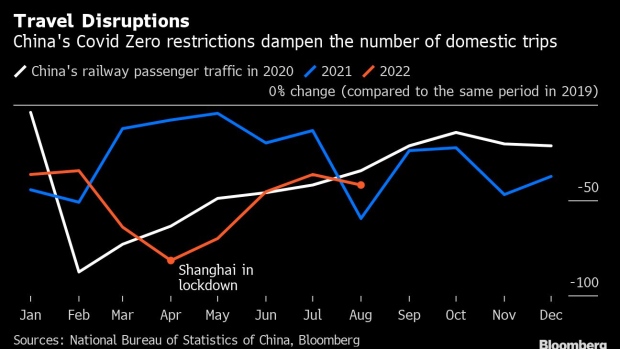Oct 14, 2022
Quarantine for Intercity Travel Hobbles Business Ties in China
, Bloomberg News

(Bloomberg) -- Short trips within China have become grueling missions due to a requirement to quarantine after entering some cities, complicating simple business interactions as the government persists with its Covid Zero policy.
Traveling from Chengdu to Chongqing for a short meeting now takes several days instead of a few hours due to the need to quarantine at both ends, according to European Chamber in China Vice President Massimo Bagnasco. The distance between the two important hubs in southwest China is about 300 kilometers (186 miles), similar to New York to Baltimore.
The same applies for other major cities, including the capital Beijing and Shanghai. Travelers also need to take several PCR tests.
Bagnasco was among chamber members speaking Thursday evening about the challenges of doing business in China under Covid. He spent 20 days in isolation in Chengdu in September, when the city of 21 million people was locked down to stamp out a virus outbreak that peaked at 211 a day.
“Now even domestic mobility is a concern, especially for the service sector because people can’t move and can’t leave,” said Bagnasco, who was jokingly called a “lockdown specialist” by the host of the briefing.
Adding to the misery, this summer the region suffered a heatwave, drought, forest fires and an earthquake.
China isn’t relenting with its approach. If anything, it is clamping down even harder ahead of the once-in-five-years Communist Party congress, which is due to start this weekend in Beijing. There, President Xi Jinping is expected to secure a third term in power and trumpet the success of his Covid Zero policy, despite the social and economic costs.
The International Monetary Fund estimates that China’s economic growth will likely slow to just 3.2% this year, short of the government’s official goal of 5.5%, the organization’s senior representative in China, Steven Barnett, said in an interview with Bloomberg Television on Friday. The government may not move away from its Covid Zero policy until the second half of 2023, he said.
Klaus Zenkel, another European Chamber vice president, said unpredictable Covid rules, constant testing and localized lockdowns are also hurting business interactions and everyday life in south China. In Shenzhen, PCR tests are required every 24 hours and visitors coming from so-called medium- and high-risk areas can’t see anyone for three days. They’re also banned from group meals and gatherings for seven days after arriving in the city.
The European Chamber’s South China chapter canceled its main annual event in Shenzhen and members have scrapped meetings, Zenkel said.
©2022 Bloomberg L.P.


